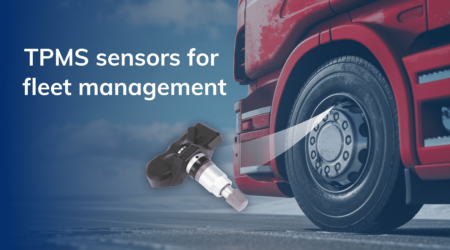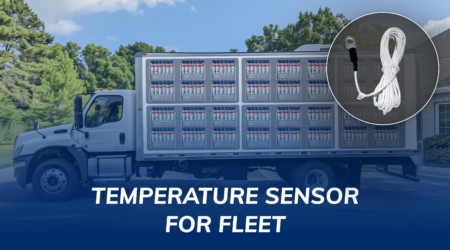8 Reasons Fuel Tank Sensors Are Essential for Fleet Management

In fleet management, precision and efficiency are key to success. One area that demands close attention is fuel management, as fuel costs make up a large part of a fleet’s operating expenses. Poor fuel management can lead to significant financial losses. That’s where fuel tank sensors come in, offering accurate, real-time data on fuel levels and usage.
In this blog, we’ll explore the top eight reasons why fuel tank sensors are essential tools for managing a fleet effectively. We’ll also discuss how these sensors contribute to operational efficiency, cost savings, and overall fleet performance, making them essential for any fleet manager aiming for excellence.
Why Are Fuel Sensors Important in Fleet Management?
Fuel tank sensors are vital in fleet management for several reasons. They enhance cost efficiency by accurately monitoring fuel, identifying wastage, and reducing consumption. Real-time data from these sensors aids in better route planning and vehicle utilization, boosting operational efficiency. They also help in early detection of potential vehicle issues, enabling preventive maintenance. Additionally, these sensors improve security by preventing fuel theft, unauthorized usage, and assist in accurate budgeting and financial planning. They contribute to environmental sustainability by reducing carbon emissions and ensure compliance with regulatory standards. Furthermore, they provide insights into driver behavior, encouraging efficient driving practices.
Benefits of Using Fuel Sensors
Accurate Fuel Monitoring
Fuel tank sensors provide precise measurements of the fuel levels in each vehicle’s tank. Unlike traditional methods that rely on manual checking or estimations, these sensors deliver real-time data, allowing fleet managers to track fuel consumption accurately. This accuracy helps in identifying patterns and disparity that might indicate fuel theft or leakage.
Example : A logistics company integrated fuel tank sensors into their fleet. Over six months, they noticed a consistent disparity in fuel consumption reports from one of their trucks. Upon investigation, they discovered a small leak in the fuel tank, which was promptly repaired, saving them thousands of dollars in potential fuel loss.
Enhanced Route Planning and Efficiency
With accurate fuel data, fleet managers can plan more efficient routes, reducing unnecessary mileage and fuel consumption. Fuel tank sensors enable managers to determine the most economical routes and schedules, ensuring optimal usage of each vehicle.
Example : A delivery service used data from fuel tank sensors to optimize their delivery routes. By avoiding routes with heavy traffic and planning refueling stops more strategically, they reduced their overall fuel consumption by 15%, significantly lowering operational costs.
Preventive Maintenance and Reduced Downtime
Fuel tank sensors can provide insights into the overall health of a vehicle’s fuel system. By monitoring fuel usage patterns, fleet managers can identify potential issues such as clogged fuel filters or malfunctioning fuel injectors before they cause major problems. This proactive approach to maintenance helps in minimizing vehicle downtime and extending the lifespan of the fleet.
Example : A transportation company noticed irregular fuel consumption in one of their buses. The data from the fuel tank sensor pointed towards a malfunctioning fuel injector. Addressing the issue early prevented a breakdown and costly repairs, ensuring that the bus remained operational and on schedule.
Improved Cost Management and Budgeting
Understanding fuel consumption patterns allows fleet managers to forecast fuel expenses more accurately and allocate budgets more effectively. Fuel tank sensors provide detailed reports that help in setting realistic fuel budgets and identifying areas where costs can be reduced.
Example : A construction company used fuel tank sensors to monitor the fuel usage of their heavy machinery. By analyzing the data, they were able to identify inefficient machines and implement fuel-saving practices. This resulted in a 10% reduction in fuel costs, allowing them to reallocate funds to other critical areas of their operations.
Enhanced Security and Theft Prevention
Fuel theft is a common issue in fleet management, leading to significant financial losses. Fuel level sensors can detect unusual drops in fuel levels, alerting managers to potential theft. By providing real-time alerts and historical data, these sensors help in identifying and addressing theft incidents promptly.
Example : A logistics firm experienced frequent fuel thefts, impacting their profitability. After installing fuel tank sensors, they were able to detect and investigate abnormal fuel drops. The sensors provided evidence that led to the identification and termination of dishonest employees, significantly reducing fuel theft incidents.
Driver Behavior Monitoring
Fuel tank sensors can offer insights into driver behavior by tracking fuel consumption patterns. Sudden spikes in fuel usage can indicate aggressive driving habits such as rapid acceleration or excessive idling. By identifying these patterns, fleet managers can implement training programs to promote more efficient driving practices.
Example : A delivery company used fuel data to identify drivers with high fuel consumption. They conducted training sessions on fuel-efficient driving techniques, resulting in improved driving behavior and a notable decrease in fuel costs.
Accordance with Environmental Regulations
Optimizing fuel management is not just about saving costs; it’s also about protecting the environment. Many regions have strict regulations regarding fuel usage and emissions. Fuel tank sensors help fleets o with these regulations by monitoring and optimizing fuel consumption, thereby reducing the carbon footprint.
Example : A public transportation fleet utilized fuel tank sensors to track and optimize fuel use, ensuring accordance with local environmental regulations. This proactive approach helped them avoid fines and contribute to environmental sustainability.
Real-Time Alerts and Analytics
Advanced fuel tank sensors come equipped with real-time alerts and detailed analytics. These features enable fleet managers to receive immediate notifications of any irregularities in fuel levels, such as sudden drops indicating possible theft or leaks. Additionally, comprehensive analytics provide a deeper understanding of fuel usage trends, aiding in strategic decision-making.
Example : An international logistics company relied on real-time alerts from fuel tank sensors to address potential fuel theft immediately. The detailed analytics helped them optimize their fuel purchasing strategy, resulting in significant cost savings.
Customer Testimonials
“Adding fuel tank sensors to our fleet has made a big difference. We’ve been able to track fuel consumption accurately and identify issues before they become major problems. Our fuel costs have dropped by 20% since we started using these sensors.” – John D., Logistics Manager
“The data from fuel tank sensors helped us optimize our delivery routes, reducing fuel consumption and improving our overall efficiency. It’s an investment that paid off within the first few months.” – Sarah L., Operations Director
“Fuel theft was a recurring issue for us until we integrated fuel tank sensors into our fleet. The real-time alerts and detailed reports have made it much easier to prevent and address theft, saving us a lot of money.” – Mike T., Fleet Manager
Conclusion
Fuel tank sensors are a vital tool for modern fleet management, offering numerous benefits such as accurate fuel monitoring, enhanced route planning, preventive maintenance, improved cost management, theft prevention, driver behavior monitoring, environmental compliance, and real-time alerts and analytics. By integrating these sensors into your fleet, you can achieve greater efficiency, reduce operational costs, and ensure the smooth running of your vehicles. For more information on how fuel tank sensors can benefit your fleet, visit our website or contact us today.




